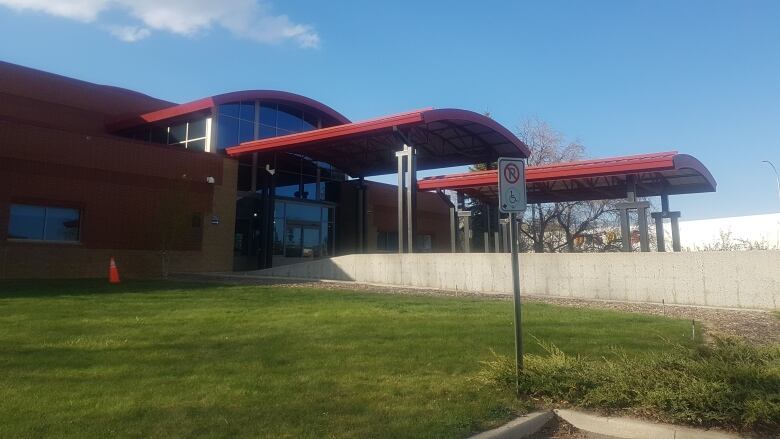Lethbridge police first in Canada to be trained on ethical policing
Project aims to teach officers how to intervene with other members in the workplace

The Lethbridge Police Service is the first in Canada to take part in an ethical policing pilot project aimed at helping officers with "bystandership."
The initiative, which was started by Georgetown University in the United States,is called Active Bystandership for Law Enforcement (ABEL)and is a hub for training, technical assistanceand research.
The goal of ABEL is to changeaspects of police culture in order to prevent misconduct andmistakes, whilepromotingofficer health and wellness.
LethbridgeStaff Sgt.Christy Woodsspoke to The Homestretchabout the training and what she hopes comes out of it.
This interview has been edited for clarity and length.
Q:What can you tell us about this pilot project that Lethbridgepolice is part of?
A:So what it is, is a bunch of scientifically-proven techniques and tactics that show why there's natural inhibitorsin our workplace and it gives us tools to provide all of our employees a toolkit and stepladder on how to dopeer intervention.
It's not to say that our current officers, or our employees, don't already act ethically or want to intervene. It's just we've never given them particular tools to get better at it or know how sometimes.
Q:So active bystandership means the officers standing next to the officer who's engaged in the incident?
A:Correct. And we're actually rolling it out to both civilian and sworn members. So bystandership can mean a lot of things. I mean, they see the same type of issues, even within two pilots in a cockpit, just because there is some rank and structure and even tenure in the workplace.
Sometimes people want to intervene but don't know how or there is just natural inhibitors that are psychologically and sociologically proven as to why people don't intervene.
We're really good at remembering the times, we do, but we kind of forget about the times we don't.So this can be applicable to even people, like in our records management area or, you know, some of the civilians that work interchangeably with the officers.
So it's not necessarily just officer toofficer, it's just giving everybody in the workplace better tools. Even more importantly, teaching people in the workplace on how to accept somebody intervening when they're seeing that you're having a bad day or maybe not acting as professionally as you should be.
Q:So what's your hope with this training? What do you hope it does for the police service?
A:It will take a while, not just logistically to roll out this training, but it's full eight hour days so we're looking at probably a year to year and a half before we can train 300 people.
I'm sort of going off of what New Orleans experienced, but what they saw is over a period of time, once the training was implemented, it reiterated [Ethical Policing Is Courageous, or EPIC]. It actually became part of the verbiage within your service.
So you actually culturally shift what it means to be loyal to somebody. We're taking care of everybody in our building for 25 years to have a healthy career, so we can have the courage and skill set to to intervene and step in when they're having a bad day. As well as prevent something where they might make a mistake or might put themselves in a situation where they're going through a stressful incident.
Not that all of our officers or most of our officers don't already think thatwe should be professional. But it's just a really tough career and sometimes people don't have great days and it's going to give people the courage and skill set to know how to intervene and also know how to accept it.
Q:Former police chief Scott Woods admitted earlier this year to a toxic workplace environment at LPS.What can this project do to help that?
A:I think that was definitely a specific situation. What we're hoping in the future is just based on not just our service, but just the current climate change. We're always looking for ways to support our officers and civilian members of having a more professional workplace and a more professional output to community. So I think we do a pretty good job right now, but there's always room for improvement.
Q: There's quite a list of well-publicized incidents involving police officers from LPS.What kind of a difference could this training make in those instances?
A: With videos and cameras now, definitely those times where something that may not be perceived positively by the public, gets out there immediately. Unfortunately, I think probably 99 per cent of the time there's amazing things that don't get published, because for news, if it's not exciting or, you know, contradictory to talk about it, we don't see it as often. So we're hoping that this will just be more tools for the officers that are already acting professionally and hopefully diminish if there was a time that's egregious and it might succumb usto bad video, maybe it can prevent the incident from happening before it even occurs.
Q:You're the first police service in Canada to sign up for this training. Do you think that what you're learning is going to be shared more widely among police officers right across the country?
A:Yeah, I think the seminar we went to, there is other Canadian police forces present. I think just due to COVID-19, they had really limited spots and it was kind of a first-come, first-serve basis.It might just be circumstantial that we were the only ones to get in. But a couple other serviceshave already reached out to ask some questions. So, yeah, we'll see how this goes. It might be spreading.












_(720p).jpg)


 OFFICIAL HD MUSIC VIDEO.jpg)
.jpg)



























































































